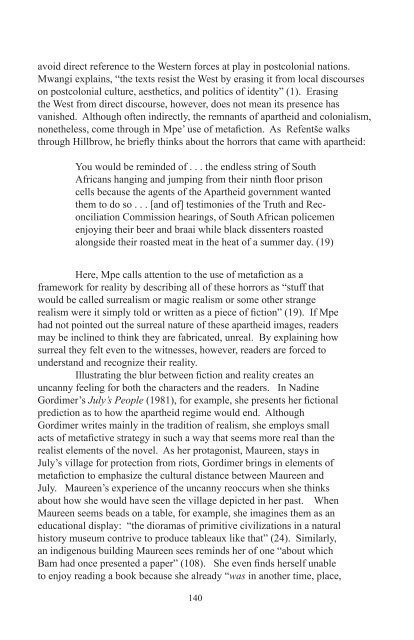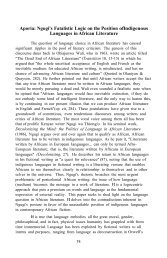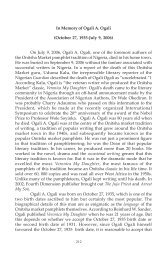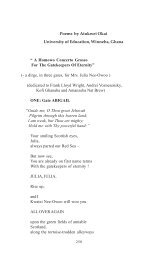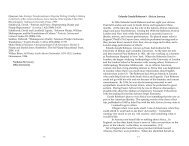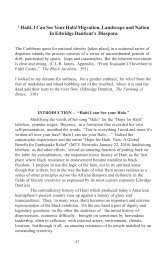Metafiction in Mpe's Welcome to our Hillbrow - African Literature ...
Metafiction in Mpe's Welcome to our Hillbrow - African Literature ...
Metafiction in Mpe's Welcome to our Hillbrow - African Literature ...
You also want an ePaper? Increase the reach of your titles
YUMPU automatically turns print PDFs into web optimized ePapers that Google loves.
avoid direct reference <strong>to</strong> the Western forces at play <strong>in</strong> postcolonial nations.<br />
Mwangi expla<strong>in</strong>s, “the texts resist the West by eras<strong>in</strong>g it from local disc<strong>our</strong>ses<br />
on postcolonial culture, aesthetics, and politics of identity” (1). Eras<strong>in</strong>g<br />
the West from direct disc<strong>our</strong>se, however, does not mean its presence has<br />
vanished. Although often <strong>in</strong>directly, the remnants of apartheid and colonialism,<br />
nonetheless, come through <strong>in</strong> Mpe’ use of metafiction. As Refentše walks<br />
through <strong>Hillbrow</strong>, he briefly th<strong>in</strong>ks about the horrors that came with apartheid:<br />
You would be rem<strong>in</strong>ded of . . . the endless str<strong>in</strong>g of South<br />
<strong>African</strong>s hang<strong>in</strong>g and jump<strong>in</strong>g from their n<strong>in</strong>th floor prison<br />
cells because the agents of the Apartheid government wanted<br />
them <strong>to</strong> do so . . . [and of] testimonies of the Truth and Reconciliation<br />
Commission hear<strong>in</strong>gs, of South <strong>African</strong> policemen<br />
enjoy<strong>in</strong>g their beer and braai while black dissenters roasted<br />
alongside their roasted meat <strong>in</strong> the heat of a summer day. (19)<br />
Here, Mpe calls attention <strong>to</strong> the use of metafiction as a<br />
framework for reality by describ<strong>in</strong>g all of these horrors as “stuff that<br />
would be called surrealism or magic realism or some other strange<br />
realism were it simply <strong>to</strong>ld or written as a piece of fiction” (19). If Mpe<br />
had not po<strong>in</strong>ted out the surreal nature of these apartheid images, readers<br />
may be <strong>in</strong>cl<strong>in</strong>ed <strong>to</strong> th<strong>in</strong>k they are fabricated, unreal. By expla<strong>in</strong><strong>in</strong>g how<br />
surreal they felt even <strong>to</strong> the witnesses, however, readers are forced <strong>to</strong><br />
understand and recognize their reality.<br />
Illustrat<strong>in</strong>g the blur between fiction and reality creates an<br />
uncanny feel<strong>in</strong>g for both the characters and the readers. In Nad<strong>in</strong>e<br />
Gordimer’s July’s People (1981), for example, she presents her fictional<br />
prediction as <strong>to</strong> how the apartheid regime would end. Although<br />
Gordimer writes ma<strong>in</strong>ly <strong>in</strong> the tradition of realism, she employs small<br />
acts of metafictive strategy <strong>in</strong> such a way that seems more real than the<br />
realist elements of the novel. As her protagonist, Maureen, stays <strong>in</strong><br />
July’s village for protection from riots, Gordimer br<strong>in</strong>gs <strong>in</strong> elements of<br />
metafiction <strong>to</strong> emphasize the cultural distance between Maureen and<br />
July. Maureen’s experience of the uncanny reoccurs when she th<strong>in</strong>ks<br />
about how she would have seen the village depicted <strong>in</strong> her past. When<br />
Maureen seems beads on a table, for example, she imag<strong>in</strong>es them as an<br />
educational display: “the dioramas of primitive civilizations <strong>in</strong> a natural<br />
his<strong>to</strong>ry museum contrive <strong>to</strong> produce tableaux like that” (24). Similarly,<br />
an <strong>in</strong>digenous build<strong>in</strong>g Maureen sees rem<strong>in</strong>ds her of one “about which<br />
Bam had once presented a paper” (108). She even f<strong>in</strong>ds herself unable<br />
<strong>to</strong> enjoy read<strong>in</strong>g a book because she already “was <strong>in</strong> another time, place,<br />
140


